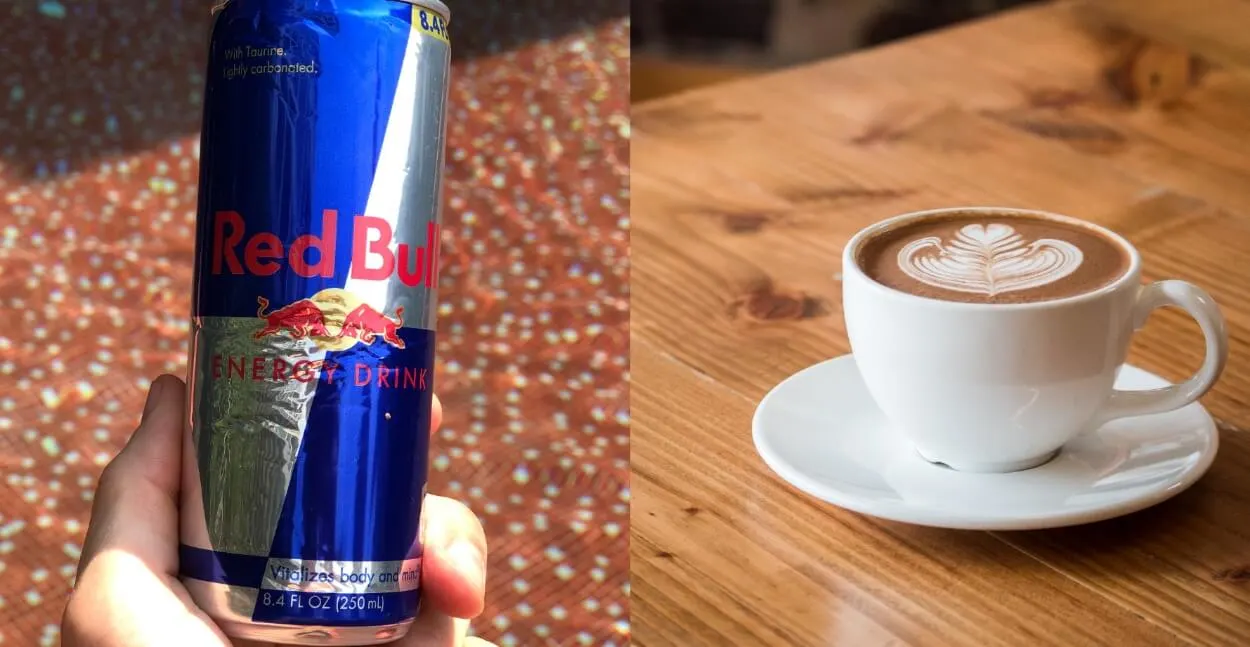While coffee has long established its presence in the caffeinated beverage scene for some time, Red Bull is quickly picking up as it’s one of the most consumed energy drinks across the world.
When these two drinks are compared and pit against each other, you may be thinking: which is better?
In short, whether you’re team coffee or team Red Bull, it really boils down to your personal preference on which beverage is better and the type of occasion on which you need to choose a drink.
But to summarize the main differences…
An 8.4 fl. oz can of Red Bull contains 80mg of caffeine, 27g of sugar, 1g of taurine, and a variety of B-group vitamins. A regular 8 fl. oz coffee typically contains 95mg of caffeine, and no B vitamins, but does have other ingredients, including magnesium and potassium. Creamers and sugar are optional in coffee, whereas Red Bull comes pre-mixed.
For a detailed discussion on the pros and cons of each drink and which one is better, stick around…
Red Bull
Red Bull Nutritional Facts
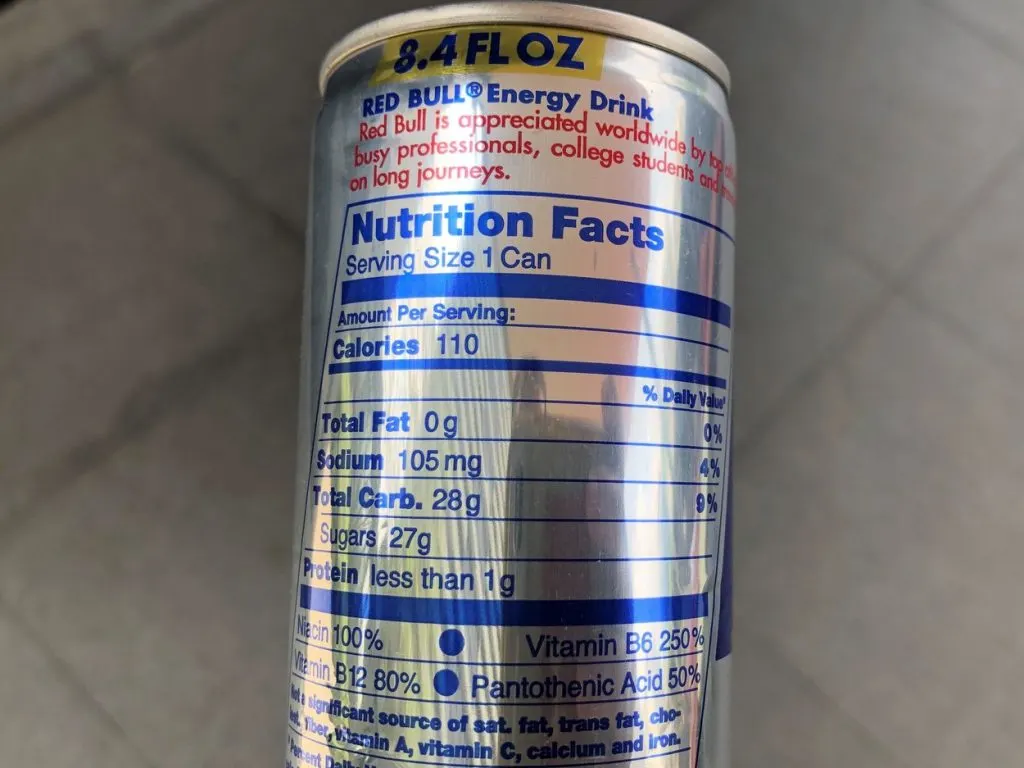
First off, let’s take a look at the nutritional information of a can of Red Bull to get an idea of what we’re working with:
| Standard Values | Red Bull (8.4 fl.oz) |
| Energy | 110 calories |
| Protein | <1g |
| Fat (Of Which Saturated) | 0g (0g) |
| Carbohydrate (Of Which Sugars) | 28g (27g) |
| Sodium | 105mg |
| Caffeine | 80mg |
| Vitamin B3 (Niacin) | 22mg |
| Vitamin B6 | 5.05mg |
| Vitamin B12 | 5.1μg |
For more information on what exactly you’re getting out of a can of Red Bull have a look at the article I’ve written on Red Bull’s nutrition facts, you’ll definitely find it informative.
Red Bull Ingredients
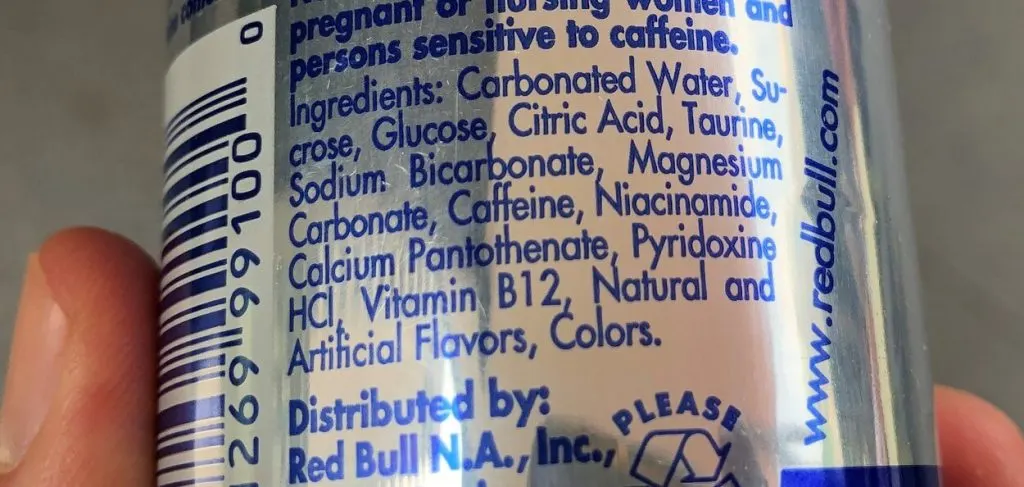
Here’s a list of the ingredients that can be found in an 8.4 fl. oz can of Red Bull:
- Carbonated Water
- Sucrose
- Glucose
- Citric Acid
- Taurine
- Sodium Bicarbonate
- Magnesium Carbonate
- Caffeine
- Niacinamide
- Calcium Pantothenate
- Pyridoxine HCl
- Vitamin B12
- Natural and artificial flavors
- Colors
Coffee

How Is Coffee Made?
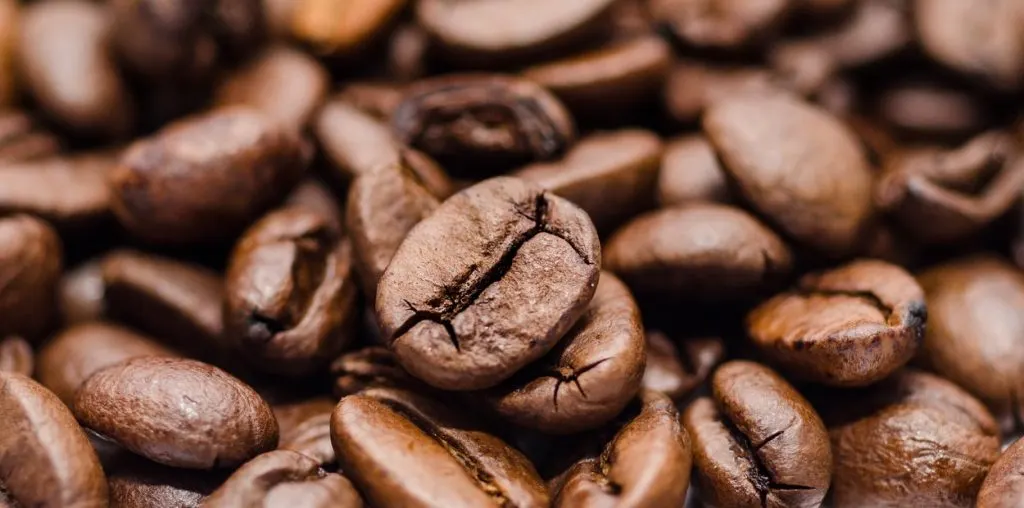
The coffee you usually drink comes from coffee beans, which are actually seeds in the berries of coffee plants. These seeds naturally contain caffeine.
After the berries are harvested, the coffee seeds undergo the washing and fermentation process, before being roasted to create different types of coffee.
The roasting process is an important step in the production of coffee, as it determines the strength of the coffee’s flavor.
After that, the coffee beans are packaged to keep them dry and fresh. Before brewing a cup of coffee, the coffee beans are ground and then mixed with hot water to make the perfect pick-me-up.
Of course, while brewed coffee is pretty much the norm, some people prefer to add sweeteners like milk, creamer, and sugar into their coffee. In fact, the addition of other ingredients such as espresso and chocolate into coffee produces other variants of coffee.
That said, not all coffee is brewed fresh from its beans. The most popular type of coffee is actually instant coffee, which you can easily make by tearing open a packet of ready-made coffee powder and mixing it with some hot water.
As you can see, one of the main differences between Red Bull and coffee is that coffee comes from natural sources while Red Bull consists of synthetic ingredients like carbonated water, taurine, and caffeine.
What Nutrients Are In Coffee?
Coffee contains plenty of useful nutrients, like B vitamins and antioxidants.
As much processing and roasting the coffee beans go through, the most important nutrients make it into your drink.
A cup of brewed coffee would contain a decent amount of vitamins and minerals, such as niacin (vitamin B3), pantothenic acid (vitamin B5), potassium, and magnesium.
These vitamins and minerals can contribute to your overall health and wellbeing, and even reduce the risk of certain diseases.
Plenty of studies have reported that consuming coffee can lower of diabetes, Parkinson’s disease and heart failure.
Naturally, this would also be contingent on the kind of coffee you often drink as well as the sweetener, if any, that you put in your beverage.
Still, the nutritional values of coffee are pretty decent compared to energy drinks, mostly from synthetic sources.
Red Bull Vs Coffee – Comparison
Calories
Red Bull contains 110 calories per 8.4 fl.oz, while the calorie content of a cup of coffee varies depending on the type of coffee and if it contains any additional ingredients.
Regular black coffee (without milk or cream) has around 2 calories, which is pretty low and wouldn’t have an impact on your overall diet.
Of course, if you add cream, milk, or chocolate into your coffee, its calorie content would increase to nearly as much as an energy drink. For example, a latte (espresso with steamed milk) has around 190 calories!
Therefore, the calorie content of coffee isn’t exactly a fixed amount and can differ based on the type of coffee you drink at the time.
As for Red Bull, 110 calories is quite moderate for an energy drink of its size, considering that the recommended daily calorific limit is between 2000 to 2400 calories for women and 2400 to 3000 calories for men.
Though I wouldn’t recommend having Red Bull too often either, as you could easily rack up on calories quickly, leading to weight gain.
That said, Red Bull does provide you with some workable energy to burn off during exercise.
The best way you can have this drink is to limit your daily intake and try not to double down on other caffeinated beverages either.
Another thing to remember is that neither coffee nor Red Bull is a substitute for a nutritious meal, so before heading off anywhere for the rest of the day, be sure to grab something substantial to eat.
If you prefer to cut calories out of your diet completely, check out my article on the best zero-calorie energy drinks for some awesome recommendations.
Caffeine Content
Each 8.4 fl.oz can of Red Bull has 80mg of caffeine, whereas coffee contains around 95mg of caffeine per cup on average.
That said, the caffeine content of coffee can be affected by a number of factors, including the type of coffee beans and serving size.
Coffee and Red Bull are pretty comparable in terms of caffeine content, though coffee does contain slightly more. The amount of caffeine in both beverages is quite modest and can supply you with a decent boost.
The caffeine content of coffee and Red Bull is also suitable for most people, but if your caffeine metabolism isn’t very high, you might want to opt for lower-caffeine drinks instead.
Of course, while Red Bull and coffee have pretty decent amounts of caffeine that won’t overwhelm you, you shouldn’t go overboard with these drinks either.
The FDA advises a daily caffeine limit of up to 400mg for healthy adults. Anything else than that, and you may wind up with negative side-effects like:
- Restlessness and shakiness
- Anxiety
- Rapid heart rhythm
- Dizziness
- Headaches
Thus, be sure to moderate your consumption of energy drinks and other caffeinated beverages and have caffeine responsibly. As much as they can keep your going, it’s probably unwise to have way too many in a day.
Sugar Content
Red Bull has 27g of sugar per 8.4 fl. oz, while coffee doesn’t contain any sugar unless you add sweeteners.
In terms of sugar content, coffee is way healthier than Red Bull and would unlikely have any effect on your overall diet unless you add cream or milk in.
As for Red Bull, its sugar content is quite high for an energy drink of its size and could have some health consequences if you don’t moderate your intake.
The AHA advises a maximum sugar intake of 25g and 36g for women and men respectively. A diet fairly high in sugar could lead to some serious health problems such as:
- Obesity
- High blood pressure
- Cardiovascular diseases
- Aging skin
- Diabetes
Hence, be sure to moderate your sugar intake to a tolerable personal limit, monitor your Red Bull intake, and avoid having too many cans of energy drinks within the same day if you can.
While you can’t control the amount of sugar you consume with Red Bull, unless you opt for the sugar-free version, you can limit your sugar intake with coffee, by simply enjoying it as it is without sweeteners.
But, if you must have your coffee sweet, try not to have it too often, as the consequences of consuming highly sweet beverages can be quite bad for your health in the long run.
What Are The Benefits Of Red Bull And Coffee?
Red Bull and coffee carry pretty similar benefits, as first and foremost, they provide you with an energy boost that keeps you going.
Aside from that, both beverages can also improve your physical performance, especially in terms of stamina and endurance.
A 2014 study reported that the consumption of a caffeine-containing energy drink enhanced the accuracy and performance of male volleyball players.
The caffeine present in coffee and Red Bull can also improve cognition. A 2016 study reported that caffeine could enhance certain cognitive functions like alertness, attention, reaction time, and vigilance.
That said, while both Red Bull and coffee have pretty similar benefits, coffee has way more since it can have a positive impact on your health and wellbeing as well.
For more information about the benefits of coffee and its effects on your body, check out the video below:
Is Red Bull Or Coffee Better?
Both Red Bull and coffee have distinct advantages and benefits that are suitable for different occasions.
Coffee works better as a morning pick-me-up since it gives you a warm and tasty jolt of energy without overdoing it. Plus, coffee tends to have an enjoyable rich taste, which you can indulge in while having your breakfast.
That said, coffee isn’t really convenient to bring around unless you have it cold.
When it comes to convenience, Red Bull checks out that box. Since it comes in a can, you can easily grab it from the fridge and bring it along with you without worrying that you’ll burn yourself.
Plus, Red Bull is best enjoyed cold and is available in many different flavors for a pretty similar price. You also don’t have to wait in line for a long time to get your can of Red Bull.
But, in terms of health benefits, coffee is the clear winner here, as it has more nutrients that are good for your health compared to Red Bull.
All in all, Red Bull and coffee are great energy-boosting beverages, so it really depends on your preferences and the occasion on which you need a drink.
Alternatives To Red Bull or Coffee
While Red Bull and coffee are convenient and tasty pick-me-ups, here’s a quick list of some great options if you’re looking for more variety:
Energy drink powders are worth a try too, as they can be personalized according to your personal taste and preferences:
- Advocare Spark
- G Fuel
- Zipfizz
- REIZE (my favorite)
REIZE (10 Out Of 10)
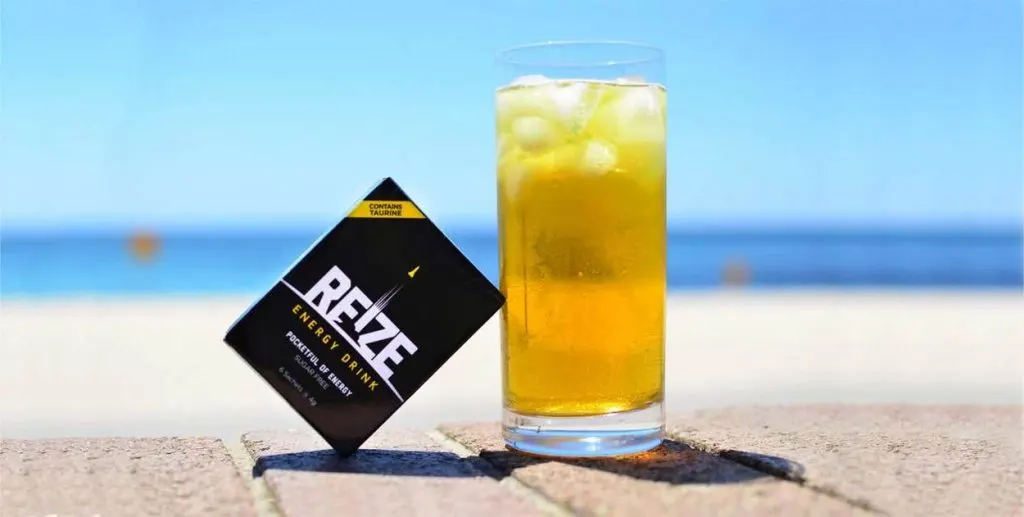
REIZE is a powdered energy drink that can be found in light and suitable 4g sachets. With a rational 50mg of caffeine, REIZE is sugar-free and consists of only 11 calories in each serving.
Besides, REIZE is packed with a smart blend of beneficial ingredients such as taurine, ginseng, and B vitamins that, when combined together, provide a smooth energy boost without the dreaded sugar crashes afterward.
The best part is that REIZE ships to your doorstep for only $1 per sachet, which is great value for money.
Give REIZE a try, and you might find it to be the smarter and quicker option compared to coffee and Red Bull.
Other Articles
Have other questions about Red Bull?
I’ve put together this epic Red Bull resource directory where you’ll find everything you could ever want to know about Red Bull energy drink.

